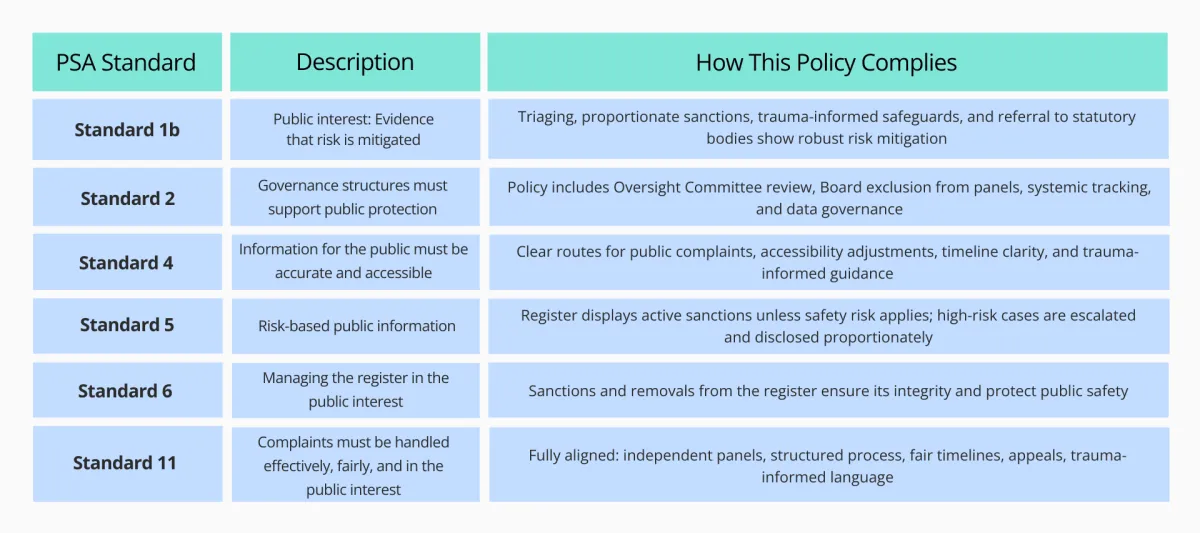TRB Complaints and Fitness to Practise Policy
PSA Standards Met: 1b, 2, 4, 5, 6, 11
Purpose
This policy outlines how the Trauma Regulation Board (TRB) receives, investigates, and adjudicates complaints and fitness to practise concerns related to trauma practitioners on its voluntary register. It affirms TRB’s commitment to public protection, procedural fairness, and trauma-informed regulation, in accordance with:
Professional Standards Authority (PSA) Standard 11
Human Rights Act 1998
Equality Act 2010
Data Protection Act 2018
Nolan Principles of Public Life
Scope
This policy applies to:
Members of the public, service users, professionals, or organisations raising a concern
All individuals on the TRB Register
Concerns regarding conduct, competence, ethics, safeguarding, or breach of TRB Code of Practice
Definitions
We do not sell or lease personal data. We may share information only when:
Complaint: A concern that a practitioner has breached TRB's Code of Ethics or caused harm
Fitness to Practise: Whether a registrant remains suitable to deliver safe, ethical trauma care
Sanction: Regulatory action (e.g. conditions, suspension, removal) in response to risk or breach
Triage: Risk-based classification: Minor, Moderate, or High-Risk
Panel: A 3-person independent panel with no conflicts of interest
Guiding Principles
Public protection is paramount
All investigations are trauma-informed, independent, and proportionate
Anonymous complaints accepted (subject to evidentiary review)
All complainants and registrants are treated with dignity, fairness, and equity
The process will uphold data security, confidentiality, and accessibility
Submitting a Complaint
Complaints can be submitted via:
Online form (preferred)
Email or written letter
Third-party referral (e.g. commissioners, employers, safeguarding leads)
Required information:
Name of practitioner (if known)
Description of concern
Approximate date(s)
Any supporting documentation
Adjustments for neurodivergent, disabled or trauma-impacted individuals are available upon request.
Initial Triage (within 5 working days)
Reviewed by Complaints Lead
Categorised as Minor, Moderate, or High-Risk
Low-risk issues may be resolved informally (with complainant and registrant consent)
Moderate- or High-risk cases proceed to formal investigation
Where immediate risk is identified, interim suspension powers may be applied
Timeframe for informal resolution: within 10 working days
Timeframe for escalation to Panel (if required): within 20 working days
Outcomes and Sanctions
The Panel may:
Dismiss the complaint (with rationale)
Issue guidance or reflection notice
Apply conditions to practice (time-limited or review-based)
Suspend the registrant
Remove registrant from the register
Sanctions are proportionate, transparent, and time-bound.
Where safeguarding risks are identified, TRB will refer to statutory authorities (e.g. LADO, DBS, police).
Your Rights
You have the right to:
Be informed about what data we hold
Request access to your data (Subject Access Request)
Rectify inaccurate or incomplete data
Withdraw consent for specific types of contact
Request deletion of data (subject to legal and ethical obligations)
To exercise these rights, contact us at [email protected]
Appeals
All registrants have the right to appeal any sanction or decision via the TRB Appeals & Restoration Policy, within 28 calendar days.
Appeals will be heard by an independent panel and must provide new evidence or grounds (e.g. procedural unfairness, disproportionality).
Risk and Public Protection Measures
TRB may suspend registration during investigation if urgent risk is present
Pattern-based concerns trigger systemic review of practitioner’s conduct or training
Public-facing register will display active sanctions (subject to safety/privacy assessment)
Safeguarding referrals are made to relevant statutory bodies where necessary
Trauma-Sensitive Procedure
Communications use accessible, respectful, and non-pathologising language
Complainants may nominate an advocate or trauma support person
Written timelines, process expectations, and informed consent will be provided
Re-traumatisation is actively mitigated through flexible evidence-taking methods
Learning and Improvement
All complaints are logged and reviewed quarterly by TRB’s Oversight Committee
Themes are extracted to improve training, policy, or regulatory focus
Annual Report includes anonymised complaint data, thematic risk trends, and response metrics
All registrants are offered targeted CPD in areas of complaint concern (e.g. ethics, consent)
PSA Standards Met by This Policy

ICO Address:
Wycliffe House, Water Lane, Wilmslow, Cheshire SK9 5AF
Helpline: 0303 123 1113
Website: https://ico.org.uk
Policy Updates
TRB may update this policy periodically. Changes will be posted on our website with a revised effective date
Company Registration Number: 10951929
Website: https://thetraumaregulationboard.org
Join the TRB Mailing List
Receive trauma-informed insights, practitioner updates, and exclusive newsletters directly to your inbox

© 2025 Trauma Regulation Board - All Rights Reserved │ Privacy Policy │Terms & Conditions
